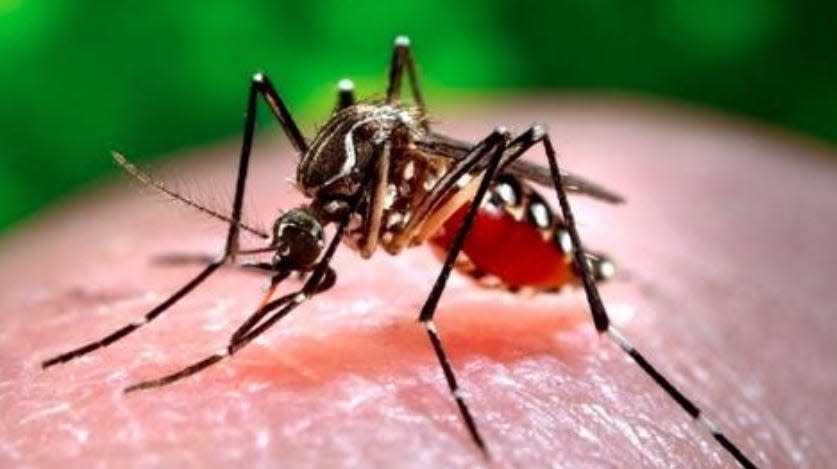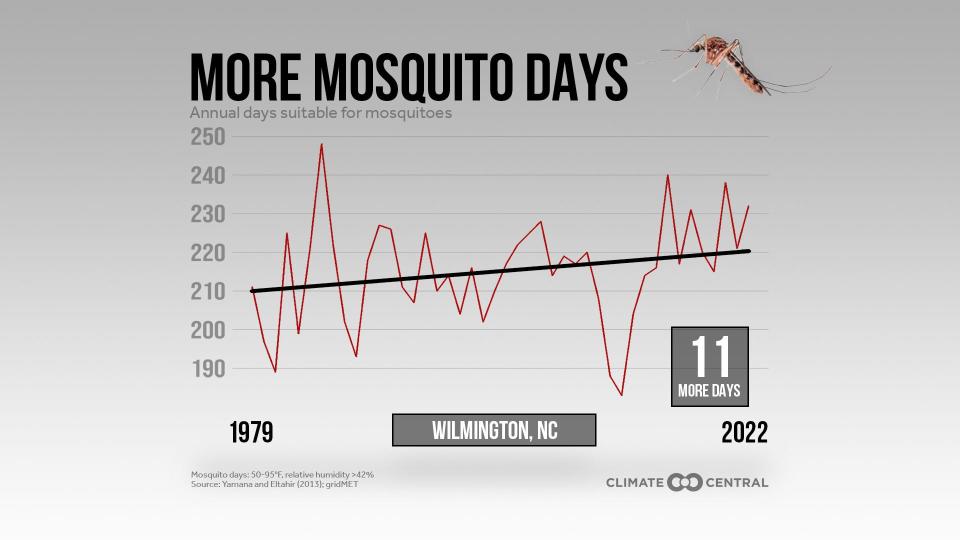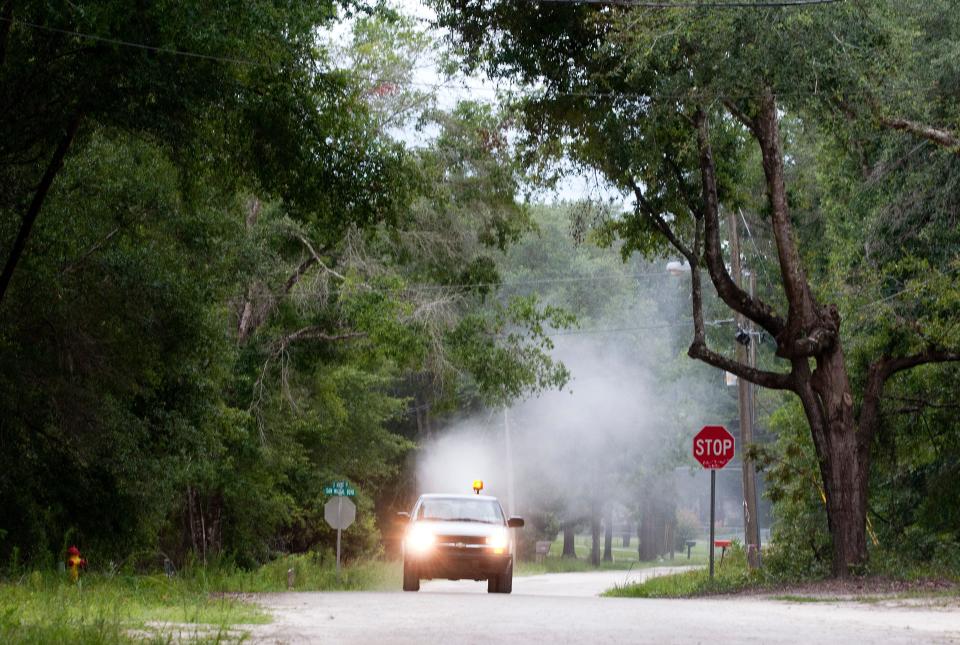Climate change could mean more breeding and biting mosquitoes for Wilmington. Here's why

They are as much a part of summer in Southeastern North Carolina as the sun, sand and surf.
But the buzz generated by these guys isn't one anyone really appreciates, and a new study shows North Carolina's warming weather fueled by climate change is creating better living conditions for the region's blood-sucking residents.
A recent analysis by Climate Central found Wilmington had 11 more "mosquito days" − for a total of 221 − in 2022 compared to 1979. The nonprofit climate communications group defined “mosquito days” as having an average relative humidity of 42% or higher and daily minimum and maximum temperatures between 50 to 95 degrees. While the Port City's numbers are trending in the wrong direction, it was better than what researchers found in Raleigh-Durham (+27 days), Greenville (+22 day) and Asheville (+22 days).

TIMELESS TREES Ancient NC trees have survived thousands of years. Will they weather climate change?
Overall, the study found that 173 locations, or 71% of the 242 U.S. locations analyzed, saw annual mosquito days increase by 16 days on average. In 55 locations, annual mosquito days increased by 21 days or more. Leading the pack was Santa Maria, California, which saw an increase of 43 days, followed closely by San Francisco at 42 days. Not surprisingly, the Southeast and South experience mosquito days for more than half of the year, the highest in the nation.
Virus vectors
As spring and fall temperatures increase as more and more heat-trapping gasses are pumped into the atmosphere, it's allowing mosquitoes to have a longer season to breed, bite, and spread viruses.
"It also allows mosquitoes to move into new ranges, often following humans as we disperse to new places," said Dr. Shannon LaDeau, a disease ecologist at the Cary Institute of Ecosystem Studies in New York's mid-Hudson Valley. "And as it gets warmer, it gives them a better chance to get established."
New Hanover County, for example, is home to more than 40 species of mosquitoes, several of which are non-native but have been able to adapt to the region's climate. That increase in species, their range and potentially numbers is expected to continue as the weather gets warmer and more humid.

From a human health perspective, LaDeau said it's the viruses the mosquitoes can carry more than the biting and general annoyance they can bring that worries public health officials. Those health risks include the Zika virus, dengue fever, Chikungunya virus, Eastern Equine Encephalitis and West Nile virus.
"We have a lot of reason to think those types of viruses will become more high risk in the coming years and decades, especially in urban areas," LaDeau said.
MORE West Nile virus cases could set a NC record in 2022. Is it tied to climate change?
According to the U.S. Centers of Disease Control and Prevention, New Hanover County reported two cases of West Nile in 2022. The county also reported an imported case of dengue fever, which is mostly found in tropical and sub-tropical climates. Last year Brunswick County also reported one case of imported Chikungunya, another virus found primarily in tropical locations
Dry and bite-free (sort of)
Even as prime mosquito days increase in the Cape Fear region, it's not all bad news − at least in the short term.
Jeff Suggs, head of New Hanover County's Mosquito Control, said the lingering drought over the past two years coupled with the dry weather so far in 2023 − albeit, not around Memorial Day − have helped keep mosquito numbers in check.
He said the numbers of insects caught in the traps scattered around the county have been low, which isn't unusual early in the summer season but are still running below typical levels.

"So we don't want to go out and start spraying for mosquitoes that would be more of a nuisance these days to squirrels or deer than people," Suggs said, noting that bug numbers generally ramp up as the summer goes on, reaching peak skeeter season in Southeastern North Carolina in late summer and early fall.
Both LaDeau and Suggs said people can help limit their exposure to mosquitoes by removing pools or containers of stagnant water, including in their gutters, from their yards, since the insects don't generally venture more than a few hundred meters from their homes when hunting. Avoiding activities at dusk and dawn and wearing long clothing also can help limit potential exposures.
WEATHER WOES Study says climate change could impact the rapid growth along the NC, SC coasts
While rain usually proceeds an impending mosquito outbreak, heavy precipitation events tied to tropical weather systems can sometimes help wash out standing water sources. Extended periods of dry weather, which allows rainwater to be absorbed quickly by thirsty soils and vegetation, also can help control the insect's numbers.
But Suggs said people actively limiting stagnant water sources is still among the best ways to keep local numbers in check, since a mosquito only needs a tablespoon or bottle cap of water to breed.
"Think small like a mosquito," he said.
Reporter Gareth McGrath can be reached at GMcGrath@Gannett.com or @GarethMcGrathSN on Twitter. This story was produced with financial support from 1Earth Fund and the Prentice Foundation. The USA TODAY Network maintains full editorial control of the work.
This article originally appeared on Wilmington StarNews: Why climate change is fueling increasing mosquito numbers in NC

